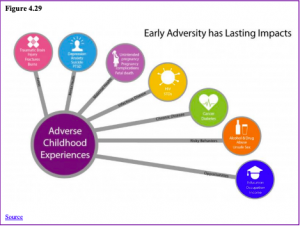Childhood Experiences and Personality Development
By the age of 6 years children develop conscience. Explores the evidence around Adverse Childhood Experiences ACEs their impact on educational outcomes and what interventions may be effective.

7 Illustrations Showing How Childhood Experiences Can Shape People In Different Ways Childhood Psychology Facts Childhood Images
This model was defined by several independent sets of researchers who used factor analysis of verbal descriptors of human behavior.

. Fox SE Levitt P Nelson CA III. This stage plays an essential role in developing a sense of personal identity which will continue to influence behavior and development for the rest of a. However little is known about how ACEs and PCEs affect family.
For the purposes of this critical review childhood trauma is defined according to the Diagnostic and Statistical Manual of Mental Disorders IV and V as exposure to actual or threatened death serious injury or sexual violence 1 2This includes experiences of direct trauma exposure. These researchers began by studying relationships between a large number of verbal descriptors. National Scientific Council on the Developing Child.
Background The objective of the study was to determine the association between adverse childhood experiences ACEs and positive childhood experiences PCEs with family health in adulthood. Children in this age group can distinguish right from wrong. Nature and nurture both matter and having love and support from parents early on makes make academic and social success as an adult more likely a study finds.
Each stage of development is marked by conflicts that can help build growth or stifle development depending upon how they are resolved. These are called psychosexual stages because each stage represents. Now having gratefully lived through a global pandemic and approaching yet another birthday that my dad did not I enter this next phase of life with a very different perspective on what we need.
Child Development 811 2840. Sadly many of these early childhood experiences stay until adulthood. The Big Five personality traits was the model to comprehend the relationship between personality and academic behaviors.
Prior research indicates that ACEs and PCEs affect individual physical and mental health in adulthood. Attachment is crucial to childrens psychological welfare and forms the basis of personality development and socialisation Bowlby 1988 Teachers youth workers and significant adults in a child. How the timing and quality of early experiences influence the development of brain architecture.
Like many psychologists I am fascinated by how early childhood experiences shape our adult selves and in particular how these developmental experiences affect cognitive and brain development. Psychoanalytic theory suggested that personality is mostly established by the age of five. Abundant research in psychology human development and other fields has shown that events and circumstances early in peoples lives influence future decisions life events and life circumstances-or what is called the life course trajectory.
The second psychosocial crisis Erikson believes occurs during early childhood probably between about 18 months or 2 years and 3½ to 4 years of age. The well parented child emerges from this stage sure of himself elated with his new found control and proud rather than ashamed. The fifth psychosocial stage takes place during the often turbulent teenage years.
During each stage sexual energy libido is expressed in different ways and through different parts of the body. Most of us had negative experiences in our early childhood. Because young ISTJs are still in the beginning stages of development they can struggle with over-use of their dominant function Introverted Sensing and an inability to access their other functions as much as they will later in life.
Early experiences play a large role in personality development and continue to influence behavior later in life. Trauma in childhood has serious consequences for its victims and for society. Recognizing the Myers-Briggs Personality Types in Childhood.
People who use drugs typically begin doing so during adolescence or young adulthood see Adolescent Drug Use but the ground. Early life experiences impact brain development and lay the foundation of a persons future helping shape the makeup of their emotions personality and overall health and well-being. The Adverse Childhood Experiences ACE Study is a longitudinal study that explores the long-lasting impact of childhood trauma into adulthood.
The ACE Study includes over 17000 participants ranging in age from 19 to 90. Freud proposed that personality development in childhood takes place during five psychosexual stages which are the oral anal phallic latency and genital stages. Uncovering the multiple pathways involved and the challenges of establishing causal relationships between past events and current difficulties.
By Susan Storm March 1. Psychosocial development in middle childhood creates morality in children. Dunn points out theres a volume of research suggesting genetics abuse and unstable or chaotic life in childhood can all contribute to personality disorder development.
The timing and quality of early experiences combine to shape brain architecture. You will be surprised to learn that some of those experiences may still be affecting you. Traumatic experiences in childhood have been linked to increased medical conditions throughout the individuals lives.
They also begin to understand moral rules of the society. Trust is a major factor in childs social relationships and its violation is viewed by them as a serious breach. But a childs temperament matters too.
As a parent youd want to avoid them so that they wont affect your child later. We outgrow most of our fears as adults.

Some Early Childhood Experiences Shape Adult Life But Which Ones Shots Health News Npr

Principles Of Personality Development In Childhood

Principles Of Personality Development In Childhood

Chapter 15 Psychosocial Development In Early Childhood Human Behavior And The Social Environment I
0 Response to "Childhood Experiences and Personality Development"
Post a Comment